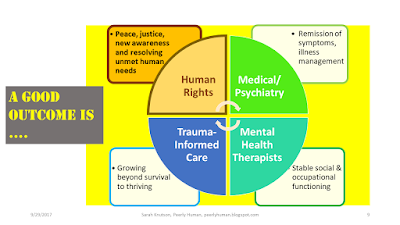
Each of the four paradigms has their own recipe for mental extremes. Let's take a look.
1. Disease model psychiatry
According to medical model psychiatry, extreme states are basically a matter of the wrong genes and biology. If you have those, you're screwed, but psychiatry will help you manage yourself.
2. Conventional 'talk' therapy
Conventional talk therapy explains many extreme states as the result of dysfunctional thinking or relationships resulting in poorly regulated behaviors and impulses. You probably came from the wrong family or learned the wrong skills or beliefs or responses for operating in the world.3. Trauma-Informed Care
Trauma-informed care generally sees extreme states as trauma-related. This may include flashbacks, triggers and traumatic reactivity to current life circumstances that evoke the images of harmful past ones.
4. Human Rights
The human rights paradigm is sees extreme states as logical and predictable. They represent understandable reactions to reality-based fears and wants. People of good faith are lacking something they need and unable to access it. This creates tension and competition for resources that either are perceived to be scarce or unfairly withheld. Human rights cautions those in power against putting fellow citizens in a situation where they have no recourse but rebellion for addressing their needs.
That's all for now.
That's all for now.



No comments:
Post a Comment
Please share your thoughts: